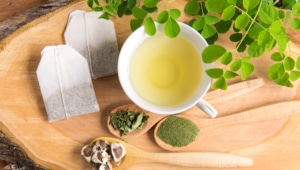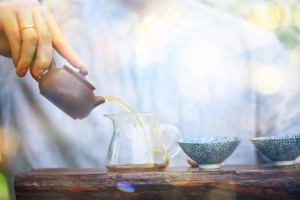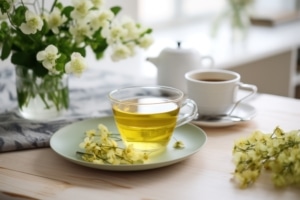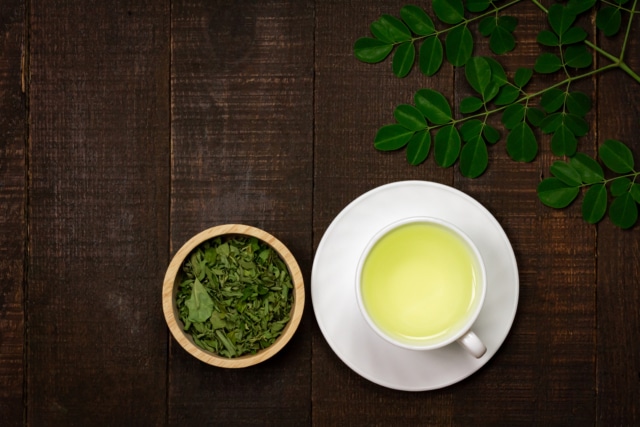5 Health Benefits of Moringa Tea & 3 Interesting Facts

For thousands of years, moringa has been used as a traditional medicinal herb in India. In this article, we cover some of the most interesting facts about moringa tea, its health benefits, and any risks you might wish to be aware of.
In ancient times, Maurian warriors ingested moringa leaf extracts as a means to relieve pain and stress caused by fighting. Nowadays, moringa tea is enjoyed for its flavors as well as its many health benefits.
It does indeed help in the reduction of pain and anxiety, but there are many more benefits to this underrated superfood.
What Moringa Tea Is: Interesting Facts

What Moringa Tea Is: Interesting Facts
Moringa tea is made from leaves of the moringa plant. This fast-growing tree is drought-resistant and easy to tend to. Almost every part of this plant, including the leaves, seed pods, roots, and flowers are edible.
It’s also known as a real superfood, thanks to its vast amounts of vitamins and minerals.
As a vegetable, moringa leaf contains plenty of protein, and seed pods contain both fiber and protein. Seeds, pods, and leaves of the moringa tree also contain high levels of heart-healthy fats.
As a tea, moringa is used for its antioxidant, antimicrobial, anticancer, antiulcer, antidiabetic, and many other benefits. In other words, if you’ve never tried moringa tea before, it’s high time you added it to your diet.
Origin and Where Moringa Tea Comes From

Origin and Where Moringa Tea Comes From
Moringa tea was first discovered in India’s North around the year 2000 BC. It was said to be called the ‘miracle tree’ then, and was lauded for its many health benefits. Traditional ayurvedic medicine praises moringa for being a cure of more than 300 health conditions.
What Moringa Tea Is Made Of

What Moringa Tea Is Made Of
Moringa tea is traditionally made from the leaves of the moringa tree. You can have moringa tea on its own, or as a delicious latte. There are some delicious recipes for both dairy-based and vegan lattes.
Moringa is available in leaf or powder form, a little like matcha.
What Moringa Tea Tastes Like

What Moringa Tea Tastes Like
Moringa tea tastes a little like green tea, with earthy, herbaceous, tangy flavors but less bitterness and more smoothness.
Moringa readily tolerates higher brewing temperatures and longer steeping times. It’s often paired with cinnamon, mint, or honey to add sweetness and balance the more earthy flavors.
Does Moringa Tea Have Caffeine?

Does Moringa Tea Have Caffeine?
Moringa tea offers plenty of nutrients, including beneficial vitamins and minerals. However, it does not contain any caffeine.
This makes it an excellent alternative for those needing to avoid caffeine and pregnant women in their second or third trimester.
The latter should speak to their doctor if in doubt. While moringa offers plenty of healthy benefits to pregnant women, it is still a relatively new option that some see as controversial.
One downside of moringa is that it also does not contain the L-theanine present in green teas and matcha. This amino acid is said to improve alertness and cognitive function.
Moringa tea is actually more helpful for improving sleep. In other words, while it doesn’t make you more alert, it may help you feel more rested in the morning after consuming it.
Nutritional Facts and Calories of Moringa Tea

Nutritional Facts and Calories of Moringa Tea
Moringa tea includes a number of beneficial vitamins and minerals, including vitamin A, B1, B2, B3, C, calcium, potassium, iron, magnesium, and phosphorus.
It also contains 15 different amino acids, polyphenols, saponins, tannins, and more.
There are no calories in moringa tea, provided you prepare it without any milk or sweeteners.
Health Benefits of Moringa Tea

Health Benefits of Moringa Tea
The moringa plant, and particularly its leaves, contains a huge number of beneficial nutrients. It’s no surprise then that moringa tea offers plenty of health benefits.
Ancient ayurvedic medicine claims it can cure over 300 different illnesses. Below are our top modern ways it can benefit your mind and body.
May Help Reduce Your Blood Sugar Levels and Cholesterol

May Help Reduce Your Blood Sugar Levels and Cholesterol
A small study concluded that moringa may help in reducing the rise in blood sugar during meals. This may make it a beneficial addition to those with diabetes.
As diabetes is linked to damaged arteries and thereby frequently causes higher cholesterol levels, it’s helpful to know that moringa tea also decreases your bad cholesterol levels.
One study even found that moringa not only helped in the reduction of bad cholesterol levels, but raised good ones at the same time.
Contains Anti-Inflammatory and Antioxidant Properties

Contains Anti-Inflammatory and Antioxidant Properties
Moringa tea contains several different antioxidants, which offer anti-inflammatory properties.
As such, it may be useful in protecting your heart health, reducing overall inflammation in the body, and aiding your immune system.
Antioxidants support your body to function better. They may also be beneficial in treating some of the underlying issues behind anxiety and depression.
Protects Against Arsenic Toxicity

Protects Against Arsenic Toxicity
In a study on mice, moringa leaves blocked some of the toxic effects of arsenic on the animals. This may make moringa a useful natural medicine for treating humans exposed to arsenic.
Arsenic can be found in some food and water, and particularly fish and shellfish. This can happen naturally or as a bi-product of mining, smelting, and industrial arsenic use.
Acute arsenic poisoning is rare, but recovery can take months if not longer.
Therefore, having the ability to counteract the toxic effects naturally may well be a breakthrough. Interestingly, moringa has also been used to counteract other toxicities, including exposure to snake venom.
Helps Increase Your Iron Levels

Helps Increase Your Iron Levels
Moringa leaves contain a high concentration of iron and other nutrients which are vital for the proper storage of iron in your body.
This makes moringa tea a great choice for people who are anemic. Some studies have actually advised moringa tea as an excellent supplement for pregnant women at risk of developing pregnancy-related anemia.
With that said, if you’re pregnant you should always speak to your doctor about any kind of supplementation, even if it’s tea, and always practice moderation.
Decreases Inflammation in Your Body

Decreases Inflammation in Your Body
Animal studies have shown that moringa tea contains anti-inflammatory compounds and antioxidants. These are said to help protect your heart health and lower bad cholesterol in your body.
Antioxidants may also reduce the overall risk of developing certain diseases, including some cancers, because they fight free radicals in your body.
Potential Risks

Potential Risks
Moringa tea doesn’t pose many risks to your health. Most risks have to do with overconsumption and can easily be avoided just by having less moringa tea in your diet.
Others depend on what part of the plant you consume. Below is a risk of the most common complications moringa tea may cause, and how to avoid them.
Extract May Cause Uterine Contractions

Moringa Extract May Cause Uterine Contractions
Moringa bark, roots, flowers, and certain extracts made from moringa may cause adverse reactions in pregnant women. Too much moringa can cause uterine contractions, potentially resulting in miscarriage.
Very large amounts may even cause infertility, liver, and kidney damage. However, as with anything, the amounts required to cause problems are quite vast.
May Cause Digestive Issues

Too Much May Cause Digestive Issues
Too much moringa tea may cause stomach upset, pain, or digestive problems. This isn’t surprising, as an overconsumption of most things can cause stomach problems.
If you find you’re experiencing problems, cut back on the amount of moringa tea you’re having.
Low Quality Moringa Powder May be Contaminated

Low Quality Moringa Powder May be Contaminated
Unfortunately, some moringa powder has been found to be contaminated with heavy metals, bacteria, and fungi. Metals included were cadmium, nickel, and arsenic.
This sounds counterproductive to say the least, given that moringa can help with arsenic toxicity. Buying high quality moringa tea that is certified organic will mean it contains at least less metals.
High quality tea should also not contain bacteria or fungi, though temperatures above 212 F kill bacteria and fungi.
Is Moringa Tea in Pregnancy Good For You?

Is Moringa Tea in Pregnancy Good For You?
Moringa tea is a slightly controversial choice for pregnancy. It appears to be great for some, provided you’re already in your second or third trimester and only have tea made from the leaves.
Little is known about the use of moringa root, flowers, or bark during pregnancy. Chemicals in these could cause complications by making your uterus contract prematurely.
You may also wish to steer clear of moringa extracts, which could be too strong or contain unsafe levels of the aforementioned chemicals.
With that said, moringa tea should be fine when consumed in moderation and after you’ve passed your first trimester.
Moringa tea doesn’t contain caffeine, but offers a variety of nutrients which may help reduce malnutrition and some pregnancy complications. Moringa also helps increase your iron levels, which can be beneficial for preventing pregnancy-related anemia.
When in doubt, it’s always a good idea to speak to your doctor before incorporating anything new or unusual into your pregnancy diet.
Simple Guide for Making the Perfect Moringa Tea

Simple Guide for Making the Perfect Moringa Tea
Moringa tea is still relatively unknown in the Western world, so the recipes available aren’t vast.
One of the best we came across incorporated moringa with ginger and turmeric, for a warming, healthy drink that’s best enjoyed on cold Fall and Winter mornings.
Top tip: ginger is great for reducing nausea and sickness, as well as relieving fevers and cold symptoms. Turmeric is also great for treating respiratory infections and digestive issues.
If you want more healthy benefits and a sweeter taste, try adding some honey. You may also add a dash of dairy milk or a plant-based alternative of your choice for a creamier, softer taste.
Ingredients:
- 1 tsp of moringa powder
- 3 cups of water
- 1” of fresh ginger root
- 1” of fresh turmeric
And here’s how you do it:
- Add the water to a pot and boil over a medium heat. Chop up the ginger and turmeric into smaller chunks and simmer gently for around 15 minutes.
- Remove your pot from the heat and stir in the moringa powder until combined. Steep for another 5 minutes.
- Gently pour your tea through a sieve and serve in two cups. Enjoy.
Tips for Drinking and Serving Moringa Tea

Tips for Drinking and Serving Moringa Tea
Moringa tea is great on its own and offers lots of earthy, fragrant flavors. It’s also delicious served in a variety of other ways.
Try these tips and see how you like your moringa tea best. Perhaps one of them will become a staple in your home or you’ll modify it for your own bespoke moringa-based drink.
Enjoy Your Moringa with Cinnamon, Mint, or Honey

Enjoy Your Moringa with Cinnamon, Mint, or Honey
Moringa offers plenty of health benefits on its own, and has great flavors akin to green tea but minus the bitterness. It’s smoother and more fragrant than some green teas, and can be readily enjoyed without adding anything.
With that said, try it with cinnamon for additional warmth and infection-fighting properties, with mint for added brightness and improved digestive health, and with honey for sweetness and a variety of health benefits for both your mind and body.
Make a Moringa Tea Latte with Cashew Milk

Make a Moringa Tea Latte with Cashew Milk
One delicious recipe we came across called for moringa powder, cashew milk, coconut oil, and maple syrup. Blend all of the ingredients using either warm or cool cashew milk, and whisk until frothy.
Coconut oil may aid in speeding up your metabolism and keeping your digestive system functioning normally. This is also a great recipe for vegans, as it contains no animal-derived additives of any kind.
Have a Moringa Smoothie

Have a Moringa Smoothie
Blend a simple mix of frozen pineapple or banana, almond milk, and fresh or dried moringa leaves. Reap all of the benefits of moringa while enjoying it in a fresh, nutrient-rich way that also includes fruit.
You can also add a variety of other fruit and veg and replace the almond milk with your favorite dairy or plant-based milk. This smoothie is best enjoyed on a warm summer day.
- Chai Tea. Health Benefits and Hacks.
- Raspberry Leaf Tea. Tips, Hacks and Health Benefits.
- Starbucks Refresher. Tips and Best Drinks.
- Jelly Belly Flavors. Best and Grossest.
- Boba Flavors. Best Flavors and Types.
- Pop Tart Flavors. Tasty Alternatives and Best Flavors.
- Cinnamon Tea. Health Benefits and Tips.





